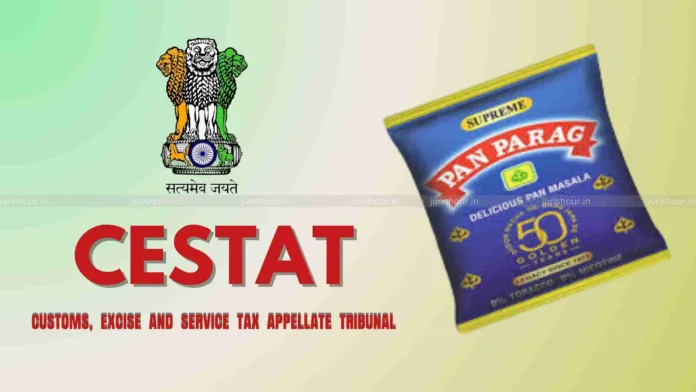The Delhi Bench of Customs, Excise and Service Tax Appellate Tribunal (CESTAT) has held that the pan masala and gutkha are freely exportable so the confiscation and penalty was unjustified.
The bench of Dr. Rachna Gupta (Judicial Member) and Hemambika R. Priya (Technical Member) has observed that the goods exported i.e. pan masala and gutkha were freely exportable goods in terms of Foreign Trade Policy. Those have wrongly been called as prohibited for alleged violation of the conditions meant for duty free imports.
An investigation was initiated based on the information about certain exporters i.e. M/s Pan Parag India Ltd. and M/s Kothari Products Ltd. that they were defrauding Government by misusing the Export Incentive Scheme namely, Duty Free Import Authorization Scheme.
Under this scheme, exporters were under obligation to indicate the technical characteristics, quality, specification and value of the essential oils used in the manufacture of pan masala/gutkha in their shipping bills at the time of export and thereafter applying for the DFIA licences under Chapter 4 of the Foreign Trade Policy 2004-09 and FTP 2009-2014.
Notification No. 40/2006 dated 01.05.2006 also specifies the similar conditions that if perfumes, essential oil/aromatic chemical are the inputs of the export produce, the exporter shall give a declaration with regard to technical characteristics, quality and its specification in their shipping bills at the time of export. But the exporters were not declaring the same in the Shipping Bills filed during the period from June 2006 to September 2011.
The department conducted searches at the premises of the appellants including those of Directors of both the above named exporters and resumed certain documents. From the scrutiny thereof, it was observed that the appellants are engaged in export of pan masala/gutkha for several years. They claimed rebates of central excise duty paid on export goods under the Compounded Levy Scheme.
The major raw material used in the manufacture of export good were beetal nut, catechu, natural essential oil etc. Most of these raw materials were procured from domestic markets except that the appellants were sometimes importing natural essential oils. They were getting DFIA licenses subsequently. But in most cases after fulfilling export obligation and after endorsement of transfer ability they used to sell said licences in the open market.
The department formed an opinion that non-disclosure of the technical specifications of the ingredients used in the exported goods was consciously done by the appellant to avail wrong benefit of DFIA scheme. This amounts to violation of provision of 4.55.3 of Handbook of Procedures of Notification No. 40/2006 and Notification No. 98/2009, thereby rendering impugned exports as prohibited.
The show cause notices were served upon the respective appellants proposing the impugned export consignments having the respective declared FOB value to be confiscated under Section 113(d) of Customs Act, 1962 and proposing that the penalty be imposed on the appellant company as well as on the co appellants i.e. the Managing Directors of the respective exporter, under Section 114 of the Customs Act, 1962.
The tribunal noted that the present SCN issued by Customs Authority on the same set of allegations is not sustainable. The impugned order imposing penalties on exporter and their Director amounts to „double jeopardy‟. Appellate authority of DGFT had required customs to effect recovery of penalties imposed. Issuance of SCN instead of initiating recovery proceedings is liable to be set aside being the act of encroachment of jurisdiction that too for such cause which stands already adjudicating by the competent authority.
The CESTAT held that how cause notice issued by the officer of Directorate of Revenue Intelligence amounts to nothing but jeopardy. The appellant cannot be penalized again for the same alleged act.
The CESTAT while allowing the appeal noted that appellants were procuring raw material domestically and were procuring synthetic oil except exceptionally. There is no evidence that the impugned goods were prepared from synthetic essential oil or the natural essential oil that too the one which was imported under DFIA Scheme.
Case Details
Case Title: M/s Kothari Products Limited Versus Commissioner of Customs (Export) New Delhi (ICD TKD)
Case No.: Customs Appeal No. 52295 of 2021
Date: 25/03/2025
Counsel For Appellant: Pramod Kumar Rai
Counsel For Respondent: Mihir Ranjan
Read More: Delhi Budget 2025: Key Highlights of BJP-Led Government’s Rs. 1 Lakh Crore Budget

